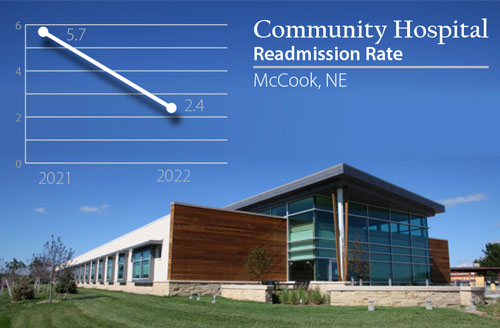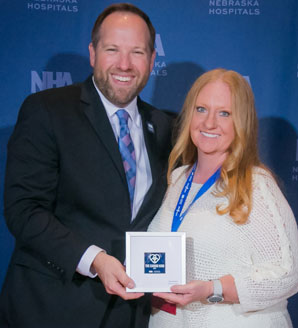Encouraging health care providers to work with patients and their family members when making health care decisions is just one part of a national effort to move toward more patient-centered care. At Community Hospital in McCook, Nebraska, education is key to such collaboration.
Community Hospital is a critical access facility that provides advanced care to more than 30,000 people throughout southwest Nebraska and northwest Kansas. In the spring of 2022, Chief Nursing Officer Molly Herzberg had a vision to improve the lives and health outcomes of their patients and community, so she created a Care Transition & Patient Education department at the hospital. Then, she hired Charlotte Marks to be the care transition nurse and patient educator. “We want to make sure our patients and caregivers truly understand the information we give them,” said Marks. “Our hope is that through education, we can help our community live longer, healthier lives at home.”
In-patient strategies
Marks’ first move that summer was to tailor care plans to better meet the specific needs of each Community Hospital patient and to enhance communication. TMF Health Quality Institute provided technical assistance and education as available to support this readmission project.
“We implemented the ‘teach-back method,’” said Marks. “We used tools and resources from TMF, which enhanced our ability to educate our patients.” Community Hospital has worked with TMF to implement health care quality improvements since 2019; TMF is under contract with the Centers for Medicare & Medicaid Services as the hospital’s Quality Innovation Network-Quality Improvement Organization (QIN-QIO).
Marks updated patients’ electronic health records and included questions from TMF’s Discharge Discussion Guide (PDF) to better assess patients’ confidence in their ability to follow discharge instructions and get needed medicine. “Answers to the questions could trigger a referral for further intervention by myself or another team member,” Marks explained.
Marks also worked with her team to improve the hospital’s discharge materials by using a binder filled with information to help patients and their family members stay organized. “On the first page is my contact information so patients know who to call after discharge.” Additional binder materials address each patient’s unique needs, so one patient’s binder could include information on blood pressure management, while another’s could contain information about signs and symptoms of sepsis.
Marks then calls each discharged patient. “It’s just a friendly, ‘Hi, how are you doing?’ call that lets them know we care and want to help them with their transition,” said Marks. It also gives patients a chance to share their concerns, which Marks and her team then communicate to the provider.
Community support
While Marks relied on Community Hospital’s clinical and ancillary staff for its quality improvement efforts, she turned to key community stakeholders to carry out the next part of her education campaign. She contacted the Heritage Senior Center and offered to regularly supply them with information on health topics relevant to the senior community.
“We began by delivering 25 copies of a flyer or fact sheet to the Heritage Senior Center,” said Marks. Her TMF QIN-QIO quality improvement specialist (QIS) offered assistance by providing patient-facing materials, such as the Zone Tools, which address a variety of topics, like managing diabetes or chronic pain. She also collaborated with the QIS to create materials for patients and community members, such as a Heart Failure Toolkit (PDF).
The response has been positive. “We now deliver 300 copies of such material every month to the senior center,” said Marks. “We are also now providing these materials to one of our local independent-living facilities, Kinship Point.”
Results
The education initiative at Community Hospital has been successful in several areas. “We are being proactive” and, as a result, there has been a dramatic decrease in readmissions coming directly back to Community Hospital: from 5.7% to 2.4% (based on internal hospital data). There have been fewer referrals (triggered by electronic health records), “thanks to our in-patient education efforts and using the teach-back method,” Marks said. “And, we have developed relationships with key stakeholders in our community that reach a large percentage of our senior adults.”
 |
 |
| Community Hospital in McCook, Nebraska, is a critical access facility that provides advanced care to more than 30,000 people throughout southwest Nebraska and northwest Kansas. After its quality improvement and education campaign, readmissions decreased from 5.7% in 2021 to 2.4% in 2022. |
Charlotte Marks received Community Hospital’s 2022 Caring Kind award for her work as the hospital’s care transition nurse and patient educator. She accepted her award from Nebraska Hospital Association President Jeremy Nordquist, MPA, during the 2022 Nebraska Hospital Association annual convention. During the convention, Marks was a guest at the Caring Kind luncheon along with other recipients from across the state. |
 Community Hospital in McCook, Nebraska, is a critical access facility that provides advanced care to more than 30,000 people throughout southwest Nebraska and northwest Kansas. After its quality improvement and education campaign, readmissions decreased from 5.7% in 2021 to 2.4% in 2022.
Community Hospital in McCook, Nebraska, is a critical access facility that provides advanced care to more than 30,000 people throughout southwest Nebraska and northwest Kansas. After its quality improvement and education campaign, readmissions decreased from 5.7% in 2021 to 2.4% in 2022. Charlotte Marks received Community Hospital’s 2022 Caring Kind award for her work as the hospital’s care transition nurse and patient educator. She accepted her award from Nebraska Hospital Association President Jeremy Nordquist, MPA, during the 2022 Nebraska Hospital Association annual convention. During the convention, Marks was a guest at the Caring Kind luncheon along with other recipients from across the state.
Charlotte Marks received Community Hospital’s 2022 Caring Kind award for her work as the hospital’s care transition nurse and patient educator. She accepted her award from Nebraska Hospital Association President Jeremy Nordquist, MPA, during the 2022 Nebraska Hospital Association annual convention. During the convention, Marks was a guest at the Caring Kind luncheon along with other recipients from across the state.